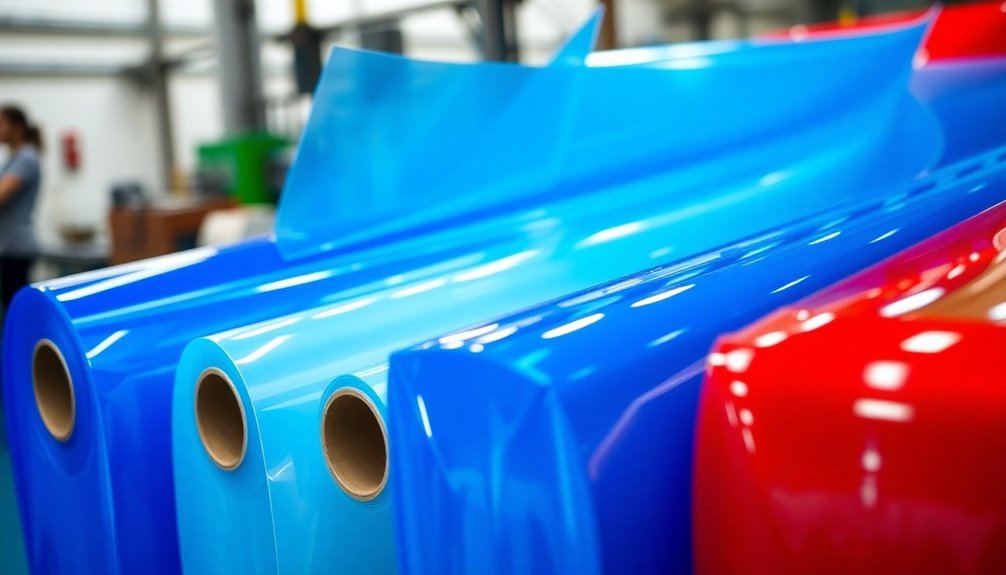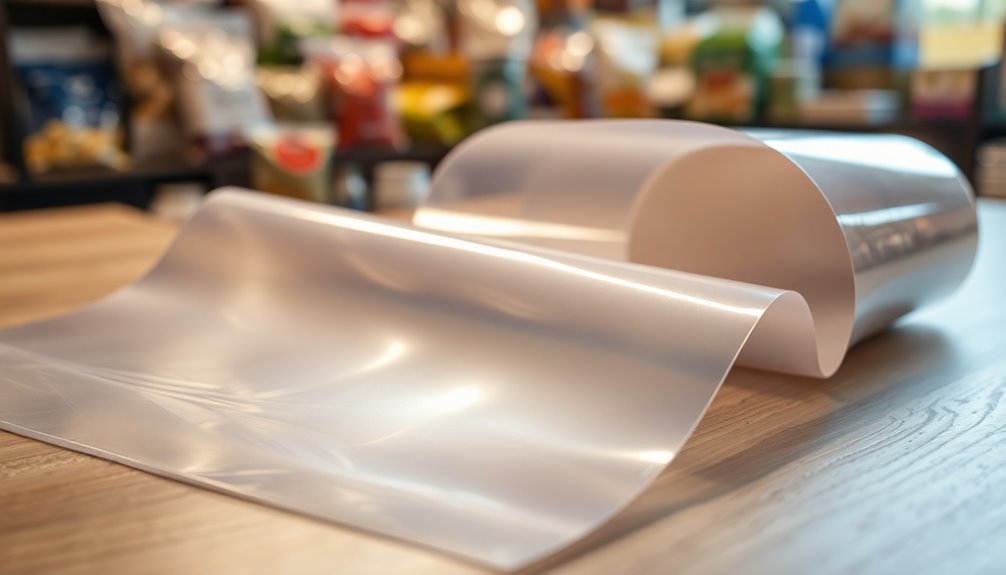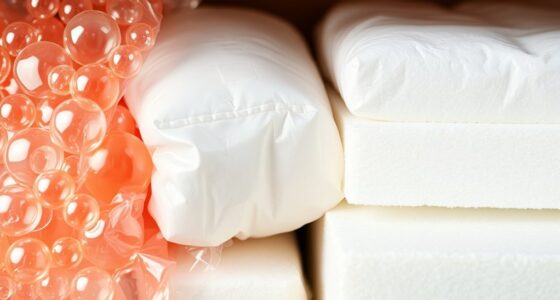PVC film is incredibly versatile and widely used across various industries. In packaging, it provides moisture barriers and allows for custom branding on products. For medical applications, it's ideal for blister packs, protecting against moisture and contaminants. In the automotive sector, PVC film offers protective coatings and seals for better performance. You'll also find it in many household items like waterproof covers and decorative films. Its durability and safety make it a popular choice in consumer products. If you're curious about more specific applications and benefits, there's plenty more to discover.
Key Takeaways
- PVC film is extensively used in flexible packaging, providing moisture barriers and enhancing product visibility through custom branding options.
- In medical and pharmaceutical applications, PVC film is crucial for blister packs, offering excellent barrier properties against moisture and contamination.
- The automotive industry utilizes PVC film for underbody coatings and sealants, enhancing durability against abrasion, moisture, and chemicals.
- In construction, PVC film is employed in roofing membranes and window frames, showcasing weather resistance and energy efficiency.
- Household products such as waterproof covers and decorative films leverage PVC film's versatility, safety, and durability for everyday use.
Overview of PVC Film
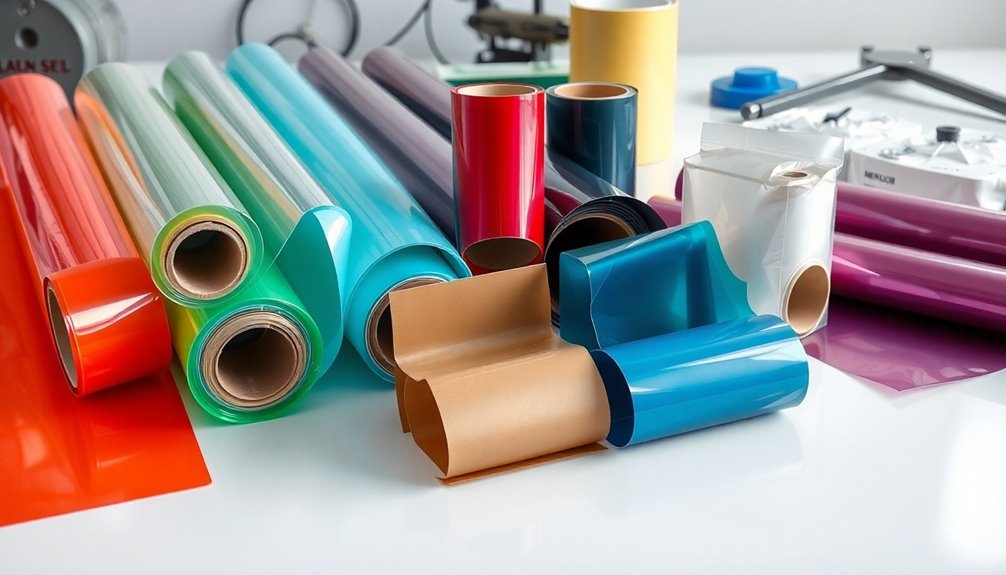
When it comes to versatility, PVC film stands out as a highly functional material in various industries. This thin plastic sheet, made from polyvinyl chloride, is produced through extrusion or calendering, and it's available in a range of thicknesses from 50 to 500 microns.
You'll find that its excellent tensile strength, along with its resistance to acids, alkalis, oils, and moisture, makes it suitable for diverse applications.
PVC film is classified into different types, such as plasticized, unplasticized, flexible, semi-rigid, calendered, and cast. Each type serves distinct industrial needs, providing tailored solutions for your requirements.
Commonly, PVC film is utilized in packaging solutions like blister packs and clamshell containers. It also plays a crucial role in construction materials, including window profiles and roofing membranes, and in healthcare products like medical bags and IV tubing.
Moreover, the versatility of PVC film allows it to excel in signage and graphics due to its excellent printability. It's also used for electrical insulation in cables and wire harnesses, making it an essential material across various industrial applications.
Key Properties of PVC Film

PVC film's key properties make it an ideal choice for a wide range of applications. One of its standout features is its high tensile strength, which ranges from approximately 15 to 80 N, depending on the formulation. This strength guarantees that PVC films can handle various stresses without compromising integrity.
Another significant advantage is the excellent chemical resistance of PVC film. It can withstand exposure to acids, alkalis, and oils, making it suitable for industrial settings where such substances are common. This property enhances its durability and reliability in demanding environments.
Moreover, PVC films exhibit exceptional barrier properties, particularly regarding water resistance. This characteristic makes them perfect for applications requiring waterproofing, such as medical supplies and food packaging, where moisture control is vital.
The thermal properties of PVC films also contribute to their versatility, with a softening point between 80°C and 84°C, and a maximum service temperature around 60°C. This guarantees stability across various temperature ranges.
With different types available—plasticized, unplasticized, flexible, and semi-rigid—PVC films can be tailored to meet specific requirements, offering a thorough solution for various industries.
Applications in Packaging
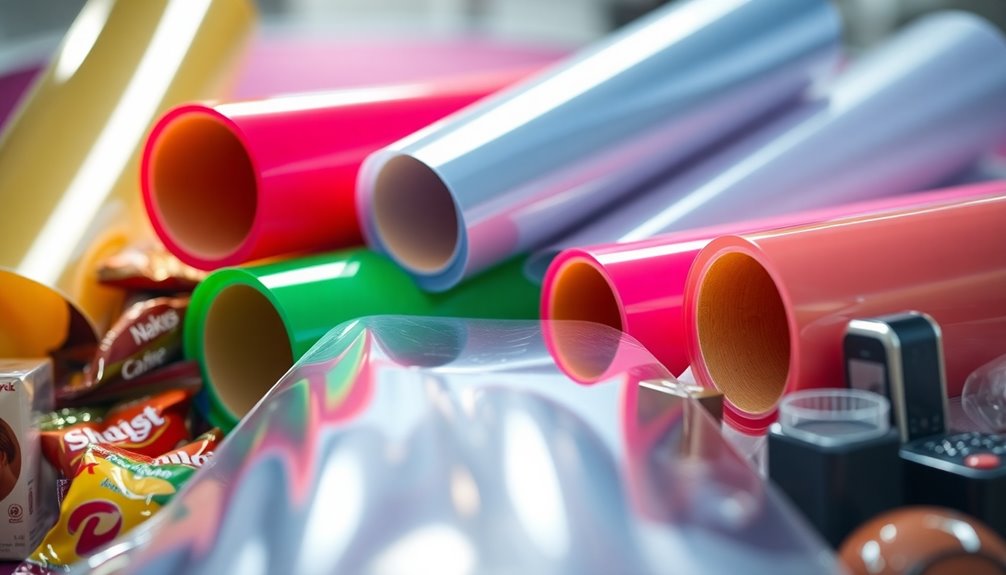
What makes PVC film a go-to choice for packaging applications? Its versatility and practicality shine through in various formats. For instance, you'll find PVC film widely used in flexible packaging, where its lightweight nature and adaptability cater to a multitude of product shapes and sizes.
This flexibility isn't just convenient; it also allows for tamper-resistant seals and enhances product visibility in clamshell packaging.
When it comes to food packaging, semi-rigid PVC films are essential. They create a robust moisture barrier, preserving freshness and extending shelf life by protecting against oxygen exposure. This guarantees that the food you purchase remains safe and delicious longer.
Additionally, the ability to print directly on PVC film opens up exciting branding opportunities. It allows you to create eye-catching promotional materials and custom packaging designs that reflect your brand identity.
Whether you're dealing with pharmaceuticals or consumer goods, PVC film delivers reliable performance, making it an ideal choice for your packaging needs. With its unique properties, it's no wonder PVC film remains a favorite in the packaging industry.
Use in Medical and Pharmaceutical
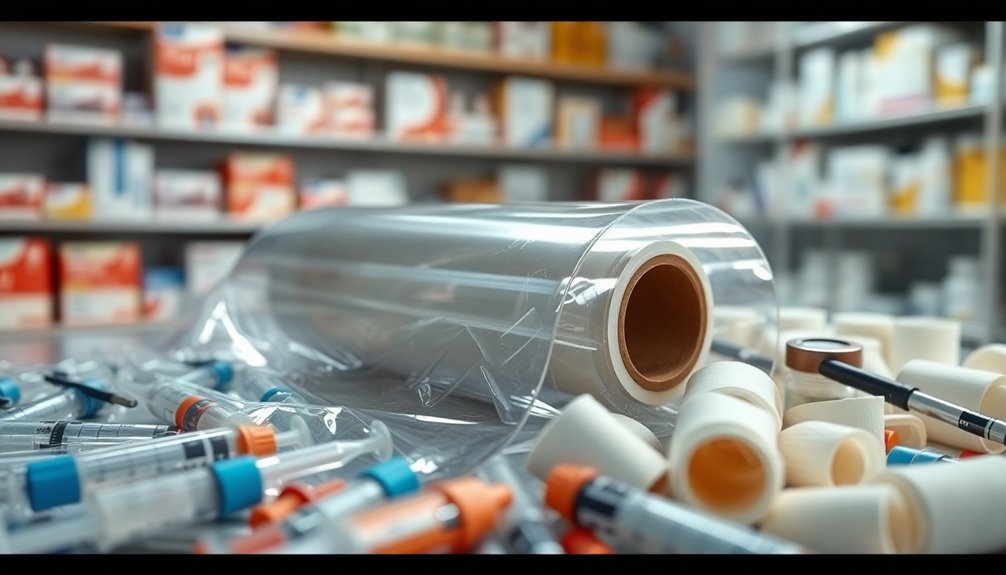
In the medical and pharmaceutical fields, the reliability of materials is essential, and that's where PVC film shines. This versatile film plays a critical role in medical packaging, particularly for blister packs containing tablets and capsules. By guaranteeing product integrity and extending shelf life, PVC film is a go-to choice for healthcare providers.
Here are some key benefits of using PVC film in this sector:
- Excellent barrier properties: Protects against moisture and contamination, maintaining the safety and sterility of medical products.
- Compatibility with sterilization methods: Works well with gamma radiation and ethylene oxide, making it suitable for medical devices and supplies.
- Non-toxic nature: Guarantees safety for children's healthcare products and sensitive medical applications.
- Durability and flexibility: Ideal for manufacturing IV bags and medical tubing, essential for various healthcare applications.
With its compliance with safety standards, PVC film proves to be a reliable material in medical packaging. By choosing PVC film, you're not just guaranteeing quality; you're also safeguarding patient health and enhancing the overall efficiency of the healthcare system.
Automotive Industry Applications
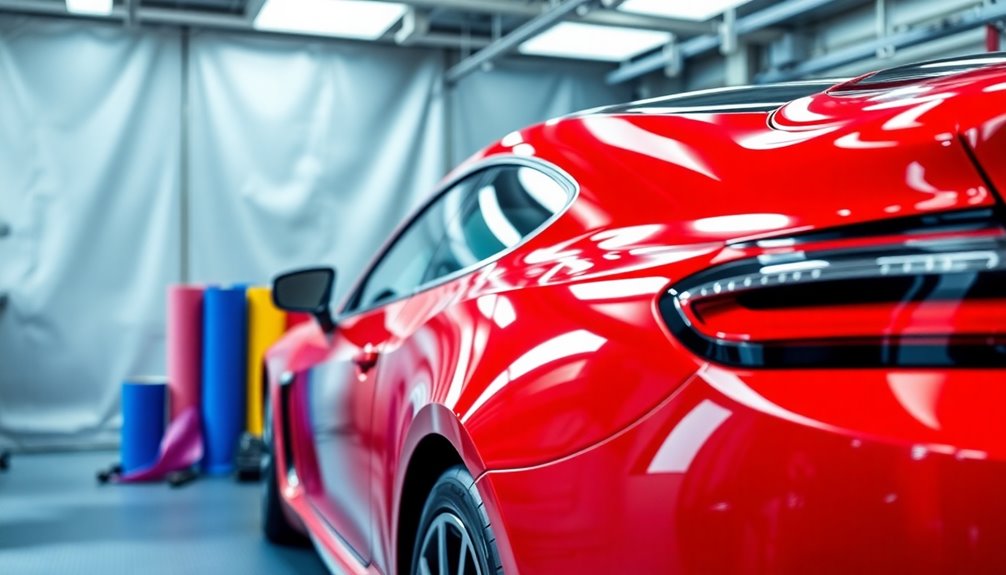
The automotive industry benefits greatly from the versatility of PVC film, similar to its applications in healthcare.
You'll find PVC film used extensively for underbody coatings, providing resistance to abrasion, moisture, and chemicals, which enhances vehicle longevity. This film's excellent weathering durability makes it perfect for exterior applications, ensuring that automotive components can withstand harsh environmental conditions.
When it comes to interior design, PVC film shines in creating lightweight yet strong interior panels. This not only improves overall vehicle efficiency but also contributes to a modern aesthetic.
You'll also appreciate how this flexible film is employed in sealants and gaskets, offering a reliable barrier against water and air leaks in automotive assemblies, ensuring a more durable vehicle.
Moreover, PVC film's compatibility with printing processes allows for custom designs on vehicle signage and branding. This enhances the aesthetic appeal while maintaining durability, making your vehicle stand out on the road.
Construction Material Benefits
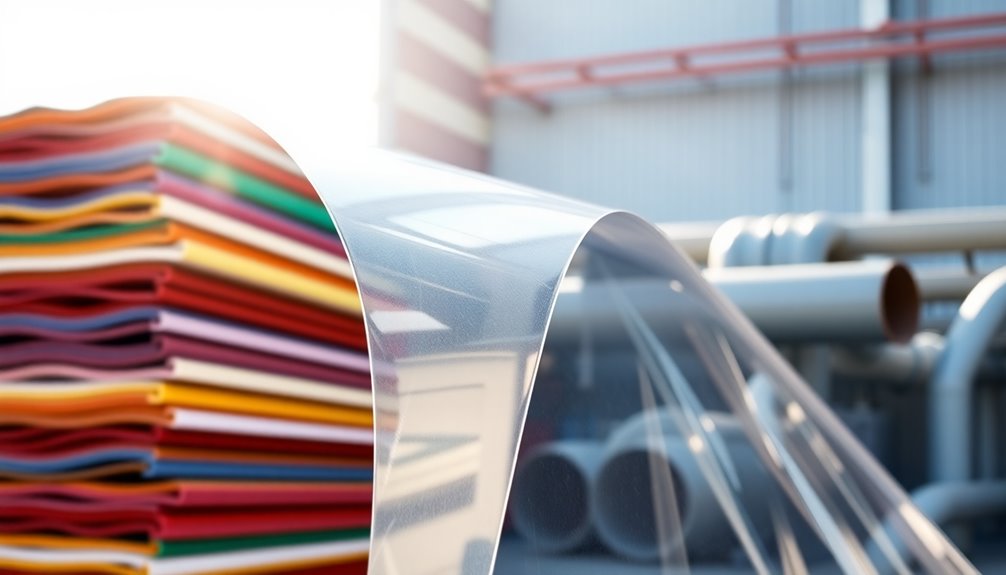
When it comes to construction, PVC film offers remarkable weather resistance that keeps your building safe from harsh elements.
Its fire safety standards not only comply with regulations but also provide peace of mind.
Plus, with energy efficiency contributions, you'll enjoy lower heating and cooling costs, making it a smart choice for any project.
Weather Resistance Features
Often regarded as a reliable choice for construction, PVC film's weather resistance features make it ideal for outdoor applications. This material excels in providing durability and protection against harsh environmental conditions, ensuring that your projects withstand extreme temperature fluctuations and moisture exposure.
Here are some key benefits of using PVC film in construction:
- Exceptional weather resistance: It effectively resists UV radiation, preventing degradation and color fading.
- Low maintenance: You won't need to worry about frequent replacements, as PVC film retains its structural integrity over time.
- Thermal insulation: Its insulating properties enhance energy efficiency, helping to lower heating and cooling costs.
- Versatile applications: Perfect for roofing membranes and window frames, it adapts well to various outdoor settings.
With its ability to endure the elements, PVC film is an excellent investment for any construction project.
You'll appreciate how it combines functionality with longevity, ensuring your outdoor structures remain protected and energy-efficient for years to come.
Fire Safety Standards
While considering materials for construction, you'll find that PVC film stands out for its impressive fire safety standards. This material is self-extinguishing due to its high chlorine content, which notably enhances fire safety in various construction applications. Its fire-resistant properties help prevent the spread of flames, making it an ideal choice for roofing membranes and wall coverings.
Here's a quick overview of PVC film's fire safety benefits:
| Feature | Description | Benefits |
|---|---|---|
| Self-Extinguishing | High chlorine content | Reduces fire spread |
| Compliance with Standards | Meets regulatory fire safety standards | Guarantees safety in buildings |
| Low Toxic Emissions | Emits fewer harmful chemicals when burned | Minimizes toxic exposure |
Additionally, PVC film's durability and low maintenance requirements contribute to long-term safety. It withstands harsh environmental conditions without compromising structural integrity, making it a reliable choice for both commercial and residential buildings. By opting for PVC film, you're not just choosing a material; you're prioritizing safety in your construction projects.
Energy Efficiency Contributions
As you explore energy-efficient building materials, you'll find that PVC film plays a crucial role in enhancing overall energy performance. Its impressive thermal insulation properties help keep indoor temperatures stable, which is essential for reducing energy waste.
Additionally, the moisture resistance of PVC film minimizes air infiltration, further preventing energy loss.
Here are some key benefits of using PVC film in construction:
- Excellent Thermal Insulation: Keeps buildings warm in winter and cool in summer, reducing heating and cooling costs.
- Moisture Resistance: Prevents air leaks, maintaining stable indoor conditions and reducing energy consumption.
- Durability: Its long-lasting nature means fewer replacements, resulting in lower overall energy use throughout the material's lifecycle.
- Sunlight Reflection: PVC roofing membranes reflect sunlight, lowering heat absorption and cooling costs for buildings.
PVC Film in Consumer Products

When you think about consumer products, PVC film plays a crucial role in enhancing safety and durability.
It's commonly found in household items and decor, while also offering customizable packaging solutions that meet various needs.
Understanding its versatility can help you appreciate its significance in everyday products.
Household Items and Decor
PVC film has become a staple in many households, transforming everyday items into functional and stylish pieces. Its versatility and durability make it an excellent choice for various household items, guaranteeing they remain both practical and aesthetically pleasing.
You can find PVC film in a range of applications, enhancing your home decor while providing protection.
Here are some common uses of PVC film in household items and decor:
- Waterproof furniture covers: Protect your outdoor furniture from moisture and dirt.
- Decorative window films: Enhance privacy and aesthetics without blocking natural light.
- Shower curtains and tablecloths: Enjoy durable, mold-resistant materials that are easy to clean.
- Arts and crafts projects: Create vibrant wall decals and custom gift wraps for a personal touch.
Using PVC film in your home not only elevates your decor but also guarantees longevity and easy maintenance.
Whether you're looking to refresh your space with decorative window films or craft unique items, PVC film offers countless possibilities to make your household items both functional and stylish.
Safety and Durability
Ensuring safety and durability in consumer products is essential, and PVC film excels in these areas. It's non-toxic and complies with safety standards like FDA and CPSC, making it a safe choice for various applications, including children's toys and food packaging. The inherent durability of PVC film provides resistance to abrasion, moisture, and chemicals, ensuring long-lasting performance in products you use daily.
Here's a quick overview of PVC film's key properties and applications:
| Properties | Applications |
|---|---|
| Non-toxic | Food packaging |
| Fire-resistant | Children's toys |
| Moisture-resistant | Furniture coverings |
| Easy to clean | Home decor items |
| Excellent insulation | Curtains and window covers |
With its fire-resistant properties due to high chlorine content, PVC film minimizes fire hazards in consumer products. Plus, its excellent thermal insulation can help you save on energy costs. The low maintenance requirements make it an economical choice, as it doesn't hold dirt and is easy to clean, enhancing product longevity. This combination of safety and durability makes PVC film a smart choice for your consumer products.
Customizable Packaging Solutions
Customizable packaging solutions have become essential for brands looking to stand out in a competitive market. PVC film offers a versatile approach to packaging, especially for food products and other consumer goods. Its excellent properties guarantee the integrity and appeal of your items.
Here are some key benefits of using PVC film for customizable packaging:
- Moisture Barrier: Protects against moisture and oxygen, extending the shelf life of food products.
- Design Flexibility: Allows for high-quality graphics, helping your products catch the eye on retail shelves.
- Durability: Resistant to tearing and puncturing, guaranteeing safe transport and storage of consumer goods.
- Tailored Solutions: Available in various thicknesses, colors, and finishes to meet specific branding needs.
Custom Solutions for Industries

How can industries effectively meet their specific needs? Custom PVC solutions can make a significant difference. With converting services like laminating, slitting, sheeting, and printing, you can create tailored products that align perfectly with your operational requirements. An expert team is available for consultation, guiding you to select the right PVC film for various applications while ensuring compliance with industry standards.
Here's a quick overview of the custom solutions available across different sectors:
| Industry | Custom Solution | Key Properties |
|---|---|---|
| Packaging | Laminated PVC film | Moisture barrier |
| Construction | Sheeting and slitting | UV resistance |
| Healthcare | Customized medical wraps | Sterility and durability |
| Automotive | Tailored protective films | Impact resistance |
| Retail | Printed branding materials | Eye-catching designs |
High-quality production processes guarantee that your custom PVC items meet rigorous requirements. Plus, with quotes and samples readily available, you can easily assess the feasibility of these tailored products for your industry. Take advantage of custom solutions to enhance your operations and address your specific needs effectively.
Environmental Considerations

PVC film plays an essential role in balancing functionality and environmental responsibility. When you choose PVC film, you're opting for a material that aligns with sustainability goals and guarantees environmental safety.
Its recyclability is a key factor in reducing waste and promoting a circular economy. Additionally, the production of PVC prioritizes environmentally friendly practices, making it compliant with regulatory standards.
Consider these important aspects of PVC film's environmental impact:
- Recyclability: PVC film can be recycled, helping to minimize landfill waste.
- Environmental Safety: It's non-toxic and tested for safety, posing no health risks during normal use.
- Sustainability: Its long lifespan means fewer replacements, which conserves resources and energy.
- Fire Safety: The high chlorine content enhances fire safety, making it self-extinguishing and reducing ignition risks.
Market Trends and Insights

You'll notice that the demand for PVC film in packaging is on the rise, thanks to its durability and cost-effectiveness.
As industries seek more tailored solutions, customization in production is becoming essential to meet specific needs.
This shift not only boosts market growth but also enhances the versatility of PVC applications across various sectors.
Increasing Packaging Demand
A notable surge in demand for PVC film is reshaping the packaging industry, driven by its superior barrier properties that effectively protect products from moisture and oxygen. This demand is evident across various sectors, particularly in food and beverage packaging, pharmaceuticals, and consumer goods.
The excellent barrier properties of PVC film help preserve product integrity and extend shelf life, making it a preferred choice among manufacturers.
Key factors contributing to this trend include:
- Innovations in manufacturing techniques that enhance PVC film's properties
- Competitive pricing compared to alternative packaging materials
- Rapid growth in the Asia-Pacific and North American markets
- An increasing trend towards customization in packaging solutions
As companies seek effective and economical packaging options, the adoption of PVC film continues to rise.
Its versatility and reliability make it an essential material for meeting the evolving needs of the packaging sector.
Customization in Production
Customization is becoming increasingly essential in the production of PVC film, with demand soaring as industries seek tailored solutions to meet specific needs.
You'll find that sectors like packaging, construction, and automotive are driving this trend, pushing for customized PVC film that fits their unique applications. Advances in manufacturing techniques now allow for greater flexibility, enabling you to produce PVC films with distinct textures, colors, and finishes that precisely match client requirements.
Moreover, the market shows a clear preference for custom shapes and sizes, enhancing both functionality and aesthetic appeal for end-users.
This growing emphasis on tailored applications means that businesses can differentiate their products more effectively, thanks to enhanced customization options fostering competitive pricing.
As the global market for custom PVC film solutions expands—especially in the Asia-Pacific and North American regions—you're witnessing a growing recognition of PVC's versatility and adaptability.
Frequently Asked Questions
What Is the Purpose of PVC Coating?
PVC coating's purpose is to provide a protective layer that enhances durability and resistance against moisture, chemicals, and abrasion.
You'll find it commonly used in various industries, like automotive for underbody coatings, guaranteeing longevity against wear and environmental damage.
In construction, it protects roofing materials, while in medical applications, it assures sterility for items like IV bags.
Plus, you'll appreciate how easy it's to clean and maintain PVC-coated materials.
What Is PVC Most Commonly Used For?
When you think about PVC, consider its versatility.
It's commonly used for packaging materials, providing protection against moisture and oxygen.
You'll find it in construction for durable window profiles and roofing.
In the automotive industry, it enhances components like underbody coatings.
Healthcare relies on it for essential products like medical bags.
Plus, its printability makes it a great choice for signage and graphics.
PVC really proves to be a valuable material across various sectors!
What Is PVC Shrink Film Used For?
PVC shrink film's primarily used for packaging, as it wraps tightly around products when heated, ensuring a secure seal.
You'll find it beneficial in the food industry, wrapping meats and cheeses to extend freshness.
In retail, it helps bundle items for easier handling.
Additionally, it's perfect for creating shrink sleeves that enhance product labels.
Its clarity and strength also protect fragile items during shipping, ensuring they arrive safely.
What Is the Purpose of Plastic Film?
Plastic film serves multiple purposes, and you'll find it everywhere in your daily life.
It acts as a protective barrier, keeping items safe from moisture and damage. You might use it for wrapping food to maintain freshness or for packaging products to guarantee they arrive intact.
Additionally, plastic film can provide insulation and protection in construction, while also being used in medical applications to keep essential items sterile and safe.
Conclusion
To sum up, PVC film's versatility makes it an essential material across various industries. Whether you're looking into packaging, medical applications, or even automotive uses, its unique properties cater to a wide range of needs. As you explore custom solutions, keep in mind the environmental considerations that come with it. Staying informed on market trends will help you make the best choices for your projects. Embrace the potential of PVC film to enhance your products and processes!

